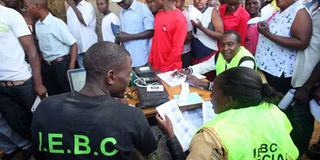Media has key role in ensuring election is fair and credible

People line up to register to vote in this photograph taken in Kabiro in Kawangware, Nairobi on January 18, 2017. PHOTO | EVANS HABIL | NATION MEDIA GROUP
What you need to know:
- It will be interesting to see if the media will this time around focus more on the substance of the elections or the game of strategy in the elections.
- Will the media help Kenyans to understand more the details of the party manifestos, leadership qualities and past achievements of the competing political groupings, or will they as usual focus on the glamour, crowds and fake news by the rival groups?
National attention is once again being focused on the media, with the electioneering ahead of the August 8 General Election having unofficially begun and a verdict on whether they will manage the storm or crack is awaited.
However, some pundits are already pushing the idea that the media should concern themselves with the conduct of a free, credible and acceptable poll, and not necessarily a peaceful election.
Among the issues that will confront the media is that of ownership of some media stations by politicians, journalists becoming embedded with political parties/tribal groupings, and growing decline of the media audience.
Others are proliferation of vernacular and largely unprofessional radio/TV stations, fake news and threats to journalists by hired goons.
In addition to investing heavily in the media, in terms of acquisitions, and contracting some veteran journalists to their campaign teams, the political class will be splashing serious monies through radio and TV commercials and advertisements.
Journalists must not surrender their professional calling to ownership and political party pressures, and professional groups, including the Media Council of Kenya, the Kenya Union of Journalists, Kenya Correspondents Association, the Kenya Editors Guild and Association of Media Women in Kenya must come out and support journalists.
DEALT WITH
The indiscipline being witnessed in most vernacular radio and TV stations must be dealt with without fear or favour. Analysts must be vetted on their relevance to the topic under discussion. Media houses should set up election coordination and news verification desks.
It’s not wrong for media to endorse parties or candidates, but this should not mean they give them undue advantage over others or slant news in their favour. Media owners should let journalists do their professional work.
It will be interesting to see if the media will this time around focus more on the substance of the elections or the game of strategy in the elections.
Will the media help Kenyans to understand more the details of the party manifestos, leadership qualities and past achievements of the competing political groupings, or will they as usual focus on the glamour, crowds and fake news by the rival groups?
Our political system has over the years been the main cause of tensions, and poverty in Kenya is still intact. The same people who have dominated Kenya’s political and economic system are still in charge of the reform process, and are beneficiaries of the old skewed system that has seen them dominate everything.
The same families and personalities that have controlled the country for years have ensured that they remain in positions that allow them to influence the ongoing reforms.
SERIOUS RELOOK
The political sector needs a serious relook as we are likely to see the same individuals and parties dominate both county and national politics.
Hopefully, the Office of the Registrar of Political Parties will instil some discipline into the politicians to bring sanity to the political spheres.
Some political parties remain dormant between elections only to resurface during elections or when clamouring for funds under the Political Parties Act.
Our politics tends to be dictated by those who fund a party to enable it to ascend to power and stay there. This has created a situation where those elected serve the interests of their funders, undermining political accountability.
A strong culture of handouts has also arisen. Women and marginalised groups, including youth, the disabled and women remain underrepresented at all levels across the political parties, which has led to unfair practices and further marginalisation that calls for redress.
Victor Bwire is deputy chief executive officer and programmes manager at the Media Council of [email protected]





